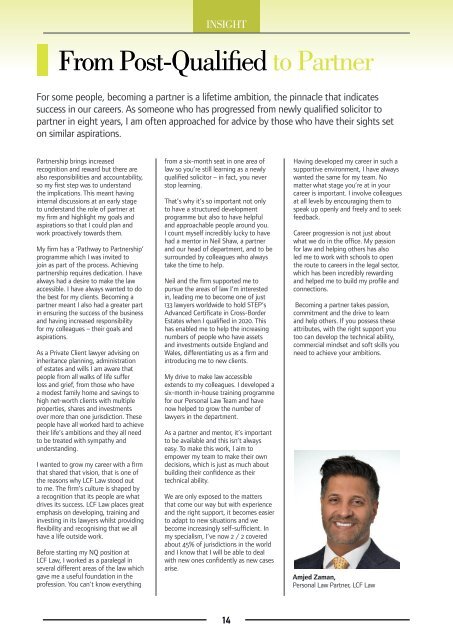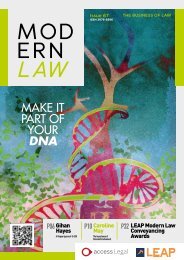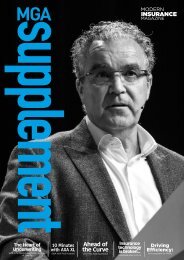Modern Law Magazine Issue 69
Create successful ePaper yourself
Turn your PDF publications into a flip-book with our unique Google optimized e-Paper software.
INSIGHT<br />
From Post-Qualified to Partner<br />
For some people, becoming a partner is a lifetime ambition, the pinnacle that indicates<br />
success in our careers. As someone who has progressed from newly qualified solicitor to<br />
partner in eight years, I am often approached for advice by those who have their sights set<br />
on similar aspirations.<br />
Partnership brings increased<br />
recognition and reward but there are<br />
also responsibilities and accountability,<br />
so my first step was to understand<br />
the implications. This meant having<br />
internal discussions at an early stage<br />
to understand the role of partner at<br />
my firm and highlight my goals and<br />
aspirations so that I could plan and<br />
work proactively towards them.<br />
My firm has a ‘Pathway to Partnership’<br />
programme which I was invited to<br />
join as part of the process. Achieving<br />
partnership requires dedication. I have<br />
always had a desire to make the law<br />
accessible. I have always wanted to do<br />
the best for my clients. Becoming a<br />
partner meant I also had a greater part<br />
in ensuring the success of the business<br />
and having increased responsibility<br />
for my colleagues – their goals and<br />
aspirations.<br />
As a Private Client lawyer advising on<br />
inheritance planning, administration<br />
of estates and wills I am aware that<br />
people from all walks of life suffer<br />
loss and grief, from those who have<br />
a modest family home and savings to<br />
high net-worth clients with multiple<br />
properties, shares and investments<br />
over more than one jurisdiction. These<br />
people have all worked hard to achieve<br />
their life’s ambitions and they all need<br />
to be treated with sympathy and<br />
understanding.<br />
I wanted to grow my career with a firm<br />
that shared that vision, that is one of<br />
the reasons why LCF <strong>Law</strong> stood out<br />
to me. The firm’s culture is shaped by<br />
a recognition that its people are what<br />
drives its success. LCF <strong>Law</strong> places great<br />
emphasis on developing, training and<br />
investing in its lawyers whilst providing<br />
flexibility and recognising that we all<br />
have a life outside work.<br />
Before starting my NQ position at<br />
LCF <strong>Law</strong>, I worked as a paralegal in<br />
several different areas of the law which<br />
gave me a useful foundation in the<br />
profession. You can’t know everything<br />
from a six-month seat in one area of<br />
law so you’re still learning as a newly<br />
qualified solicitor – in fact, you never<br />
stop learning.<br />
That’s why it’s so important not only<br />
to have a structured development<br />
programme but also to have helpful<br />
and approachable people around you.<br />
I count myself incredibly lucky to have<br />
had a mentor in Neil Shaw, a partner<br />
and our head of department, and to be<br />
surrounded by colleagues who always<br />
take the time to help.<br />
Neil and the firm supported me to<br />
pursue the areas of law I’m interested<br />
in, leading me to become one of just<br />
133 lawyers worldwide to hold STEP’s<br />
Advanced Certificate in Cross-Border<br />
Estates when I qualified in 2020. This<br />
has enabled me to help the increasing<br />
numbers of people who have assets<br />
and investments outside England and<br />
Wales, differentiating us as a firm and<br />
introducing me to new clients.<br />
My drive to make law accessible<br />
extends to my colleagues. I developed a<br />
six-month in-house training programme<br />
for our Personal <strong>Law</strong> Team and have<br />
now helped to grow the number of<br />
lawyers in the department.<br />
As a partner and mentor, it’s important<br />
to be available and this isn’t always<br />
easy. To make this work, I aim to<br />
empower my team to make their own<br />
decisions, which is just as much about<br />
building their confidence as their<br />
technical ability.<br />
We are only exposed to the matters<br />
that come our way but with experience<br />
and the right support, it becomes easier<br />
to adapt to new situations and we<br />
become increasingly self-sufficient. In<br />
my specialism, I’ve now 2 / 2 covered<br />
about 45% of jurisdictions in the world<br />
and I know that I will be able to deal<br />
with new ones confidently as new cases<br />
arise.<br />
Having developed my career in such a<br />
supportive environment, I have always<br />
wanted the same for my team. No<br />
matter what stage you’re at in your<br />
career is important. I involve colleagues<br />
at all levels by encouraging them to<br />
speak up openly and freely and to seek<br />
feedback.<br />
Career progression is not just about<br />
what we do in the office. My passion<br />
for law and helping others has also<br />
led me to work with schools to open<br />
the route to careers in the legal sector,<br />
which has been incredibly rewarding<br />
and helped me to build my profile and<br />
connections.<br />
Becoming a partner takes passion,<br />
commitment and the drive to learn<br />
and help others. If you possess these<br />
attributes, with the right support you<br />
too can develop the technical ability,<br />
commercial mindset and soft skills you<br />
need to achieve your ambitions.<br />
Amjed Zaman,<br />
Personal <strong>Law</strong> Partner, LCF <strong>Law</strong><br />
14
















